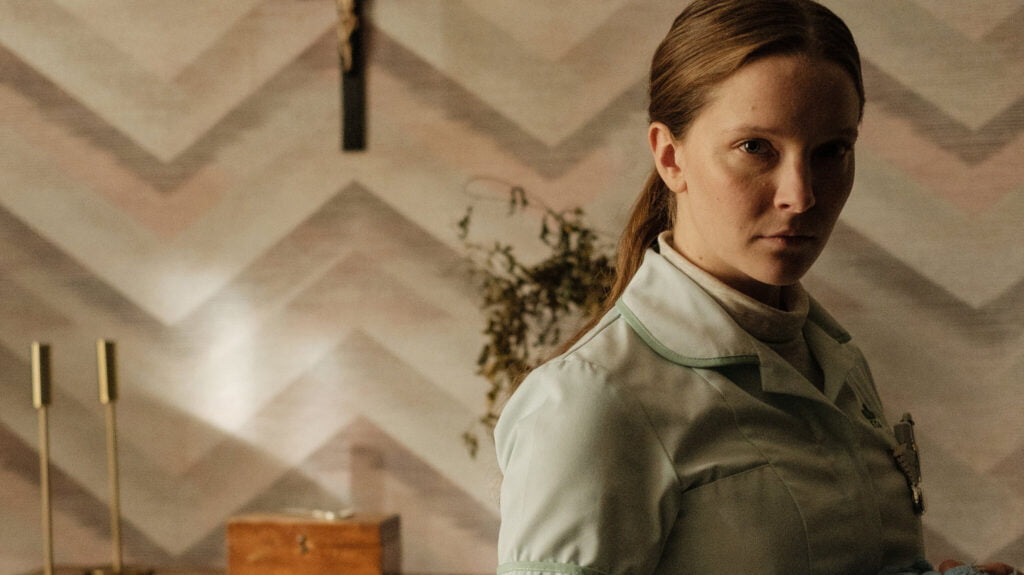Rose Glass’s directorial feature debut Saint Maud (2019) is a clever arthouse horror that deals with faith, death, and life’s purpose. The film shows us twisted realities and fantasies through the pious Maud, a mousy caretaker with a mysterious past, keeping us on the edge of our seats until the final, shocking shot. Complete with disorienting camera angles, slow yet enticing plot reveals, and intense interiority, Saint Maud is overall a wonderful trip into faith and psyche.
Exploring Faith and Psychosis in Saint Maud
According to an interview with Vulture, Glass sees a direct relationship between Maud’s faith and psychosis. Such a relationship obviously spurred some harsh criticism, but the director, coming from a Catholic background herself, sees the danger in conflating the two. They are separate experiences, and while a person may descend from one into the other, “There’s always a long, complicated series of events” that leads from religion to “terrible things,” says Glass. Saint Maud takes us through that series of events.
For much of the film, Maud takes care of Amanda, a formerly illustrious dancer played by Jennifer Ehle. Maud, as we know, is fervently religious, but Amanda is an atheist. Right away, this causes friction. Maud is not content with her own observance; no, she must convert the nonbeliever as well. She soon sets out to save the sinner’s soul and consequently oversteps all rational boundaries. Amanda feigns interest at first, even gifting her caretaker a book about the painter and artist William Blake with a note saying, “My saviour.” But who is the savior? Is it Maud, the observant Christian, or Blake, who rejected all organized religion? However, as all things must end, the relationship turns sour, and Amanda reveals her true disbelief.
Mental Illness and Religion: A Delicate Balance
Depicting mental illness is, clearly and rightfully, tricky. We don’t want to villainize those who struggle, but we shouldn’t put them on the pedestal of more-than-human either. To make the situation more complex, we can add religion. Saint Maud walks the shaky line of showcasing a character with both a strong sense of faith and strong delusions. Importantly, Glass states, “It’s a lazy and quite dangerous way of thinking, to dismiss people who do terrible things as just inherently bad or mad people.” As such, there is nuance in Maud. Her faith doesn’t stem from mental illness, and her mental illness doesn’t come from her faith. They are disparate entities that happen to collide. It is intimated that Maud turned to religion when she was suffering, alone, and desperate. Just as it happens for many people, religion saved her, giving her hope and a reason to go on. What worked for her, Maud thinks, must work for others too, right? And what better way to honor G-d than to show more people the light? Of course, what Maud doesn’t consider is that not everyone wants redemption, let alone believes in it. Where do we go from there?
One of the most chilling lines is from Maud’s head, when she is alone, thinking of the trials she has undergone for her deity. The voiceover says, “If this is how you treat your most loyal subjects, I shudder to think of how you treat those who shun you.” This shows that Maud is religious not due to the promise of love, but because of the threat of punishment. She is willing to physically harm herself quite severely if those pains will grant her G-d’s favor. It is a selfish view, not actually concerned with the spiritual well-being of others. This poses the question of how much faith is based in self-preservation and how much is truly wholehearted love.
Why Saint Maud Challenges Blind Faith
Saint Maud raises complex questions about the nature of religion without completely discounting the valid experiences of believers. I understand how some critics interpret the film, particularly the ending, as disparaging to faith, but I don’t agree with them. Blind faith, in my opinion, is not true. If we don’t question what we follow, if we don’t assess the rules for ourselves, then how do we know we are following the righteous path? Maud can be seen as a zealot, unwavering in her belief and intolerant of any and all dissenters. I can write a whole treatise on intolerance, but it’s been done before and it’s not why I’m writing this review. I’m writing to encourage you to watch a movie that will, hopefully, spur some new thoughts while providing a thrill.
